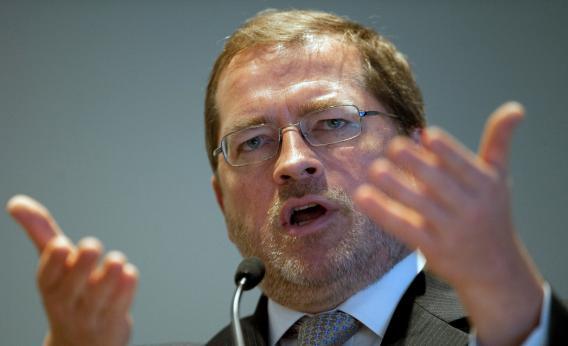The latest word out of Washington suggests that congressional talks to avert the so-called fiscal cliff are moving slowly but not necessarily surely. One sign of possible progress, however, is the small but growing number of GOP lawmakers who are now saying they are willing to abandon the Grover Norquist-authored pledge they signed promising to oppose any and all tax increases of any kind.
Bob Corker, an influential member of the Senate Banking Committee, became the latest member of the Republican caucus to publicly break with Norquist’s Americans for Tax Reform on Monday morning. “I’m not obligated on the pledge,” the Tennessee senator told CBS News’ Charlie Rose. “I made Tennesseans aware, I was just elected, the only thing I’m honoring is the oath I take when I serve, when I’m sworn in this January.”
Sens. Saxby Chambliss and Lindsey Graham and Rep. Peter King likewise suggested to varying degrees over the past several days that they’re willing to consider tax increases as part of a larger budget deal. Speaking on NBC’s Meet The Press on Sunday, King said that his anti-tax promise—which he, like most of his GOP brethren, made near the beginning of his congressional career—is not eternally binding. “A pledge you signed 20 years ago, 18 years ago, is for that Congress,” he said. “For instance, if I were in Congress in 1941, I would have supported a declaration of war against Japan. I’m not going to attack Japan today.”
Saying you’re now willing to listen to proposals that include tax increases is a far step removed from actually supporting such proposals, of course, but it nonetheless represents a noteworthy development given the no-room-for-nuance pledge that has long dominated budget negotiations.
The Washington Post with the analysis of the GOP defections:
The question from here is whether this represents a simple trial balloon or the beginning of a movement in which a large segment of the GOP embraces a tax increase as an unhappy reality. If that were to occur, it would both mark a significant shift in party orthodoxy and also threaten to make the tea party primaries of 2010 and 2012 seem tame.
Norquist is seen as one of the most powerful lobbyists in Washington. While he may not have created the anti-tax sentiment held dear by most conservatives, he has harnessed it in a way that has made it significantly more difficult for a bipartisan-minded GOP lawmaker to even look—let alone reach—across the aisle when the issue is being discussed. Much of that power, however, is a matter of numbers and momentum; most politicians have little desire to be left standing at a Capitol press conference flanked only by colleagues from the other party. (That type of thing doesn’t exactly play well with the type of voters who decide primary races.) But the inverse of that political reality also holds true: Every Republican lawmaker who casts aside the pledge now makes it that much easier for the next to do the same.
For his part, Norquist is saying publicly that the current minimutiny that appears to be unfolding won’t amount to much. “I don’t think between now and 2014 that either the South Carolina senator or the Georgia senator will vote for a tax increase,” the anti-tax crusader told The Fix, referring specifically to Graham and Chambliss.
***Follow @JoshVoorhees and the rest of the @slatest team on Twitter.***
